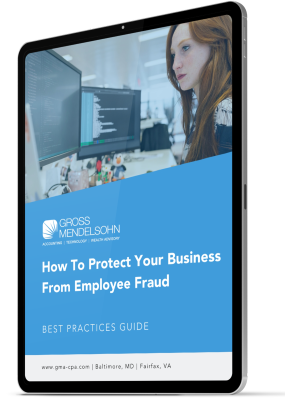Jeffrey David, the former chief revenue officer for the NBA’s Sacramento Kings, recently pleaded guilty to charges of wire fraud and identity theft in a scheme that misappropriated approximately $13.4 million of the team’s funds. Mr. David, who was the corporate officer responsible for generating revenue for the Kings, directly negotiated sponsorship, partnership, and other advertising and marketing agreements between the Kings and outside companies.
According to the plea agreement, Mr. David directed some of those companies to wire some of their payments to bank accounts held in the name of a limited liability company under his sole control, Sacramento Sports Partners, LLC.
There are lessons business owners can learn from the Sacramento Kings' embezzlement case. Let's look at how the perpetrator embezzled funds, how the scheme was uncovered, and the ways it could have been avoided.
How He Did It
At first, Mr. David drafted relatively small invoices on Sacramento Kings letterhead to send to sponsors for advertising. These invoices listed Sacramento Sports Partners as the actual billing entity, along with a commercial mailbox that Mr. David had set up for the purposes of diverting payment. In fact, the Sacramento Kings hadn’t authorized Mr. David to bill any of these companies and there were no services actually rendered. In total, Mr. David misappropriated approximately $29,000 from these initial fraudulent invoices.
Following the success of this initial activity, Mr. David looked to target higher value sponsors to defraud. The Kings had recently opened a new indoor arena and practice facility in September 2016 and Mr. David was tasked with soliciting bids and negotiating the eventual naming rights deals. As part of this process, he ultimately negotiated a naming rights deal for the stadium with Golden 1 Credit Union (“Golden 1”) and with Kaiser Permanente for the naming rights deal for the practice facility.
As Mr. David legitimately negotiated large parts of both agreements, he was intimately familiar with the terms of each deal and methods of payments. Mr. David exploited these initial agreements by negotiating “amendments” directly with Golden 1 and Kaiser Permanente, without the authorization or knowledge of the Kings. First, he suggested a new $9 million initial payment in exchange for lower payments the following years. In addition, he altered how Golden 1 would transmit payment, instructing them to wire the payment to Sacramento Sports Partners.
Similarly, Mr. David substituted a modified exhibit into the original agreement with Kaiser Permanente requiring them to make an advance payment of $4.4 million to Sacramento Sports Partners.
As Mr. David did not have the authority to make changes to the agreements, he forged the signature of the Kings executives on various documents, along with forging the signatures of executives at Golden 1 and Kaiser Permanente.
How He Used the Embezzled Funds
Mr. David used the proceeds of his scheme to purchase two California properties: one in Hermosa Beach for approximately $8 million, and one in Manhattan Beach for approximately $3.8 million. He used the additional fraud proceeds to make improvements on the homes, paid tens of thousands of dollars in personal credit card bills, paid $100,000 for a private jet membership, and other personal expenses.
How the Scheme Was Uncovered
The scheme was uncovered after Mr. David’s position was eliminated by the Kings. As a team employee was going through his old computer, they came across a folder labeled “Turbo Tax.” The folder contained evidence of the criminal acts, including details regarding Sacramento Sports Partners. Had Mr. David deleted this folder on his work computer, it’s possible that his scheme would never have been detected.
4 Ways to Avoid Employee Fraud
Business owners, listen up. There are a few things a company can do to avoid a scheme like the one perpetrated against the Sacramento Kings.
1. Executives should see signed agreements
It’s important for executives to obtain final signed copies of all significant agreements. These copies should be reviewed to ensure that no “secret” amendments are added without proper authorization.
2. A second employee should be involved in high-dollar transactions
Given the size of the payments, another Kings employee should have known the payment terms under the original agreements and confirmed that payments from Golden 1 and Kaiser Permanente were properly received based on the original schedule. If they weren’t received based on the original schedule, as Mr. David had amended them, the sponsors should have been contacted directly to investigate any discrepancies. This would have alerted the Kings that the original agreements had been amended without proper authorization.
When one employee is given too much leeway in handling invoices, payments, receivables and vendor relationships, the risk of fraud goes up, as we saw in the case of another company that fell victim to an employee and vendor who partnered to steal $1.4 million.
3. Watch for red flags and set up an anonymous reporting mechanism
While it seems that Mr. David’s co-workers at the Kings didn’t know that he had purchased multiple multimillion-dollar homes, if they did know about his spending, was there a system in place to handle an anonymous tip? Even if he was earning several hundred thousand dollars a year in salary, would he have been in a position to afford a private plane membership or other luxury-style spending? Probably not.
In another high profile fraud case, one in which an executive embezzled $7 million, the perpetrator’s actions were fueled by addiction. Red flags can be harder to spot in some cases, like this one, but it reinforces that businesses should never put too much trust in a single employee.
4. Take immediate action when a potential issue is identified
After the incriminating folder was found on Mr. David’s computer, the Kings immediately conducted an internal review, which revealed additional documents and communications regarding Mr. David’s scheme. The team then reported its findings to the authorities and the FBI investigation was reported in the newspaper in August 2018, less than two months after Mr. David’s position was eliminated by the Kings.
The swift actions of all parties involved helped recover the stolen funds.
The Kings Got Lucky
Thankfully, Mr. David’s two properties were recently sold by federal officials for a total of nearly $14.8 million. After deducting fees and other costs, the Kings expect to recoup the entire amount it lost. Many other companies that experience a fraud of this magnitude are not so lucky.
Need Help?
Our Certified Fraud Examiners and CPAs can help business owners put effective fraud prevention and detection tactics into place. Contact us online or call 800.899.4623.


